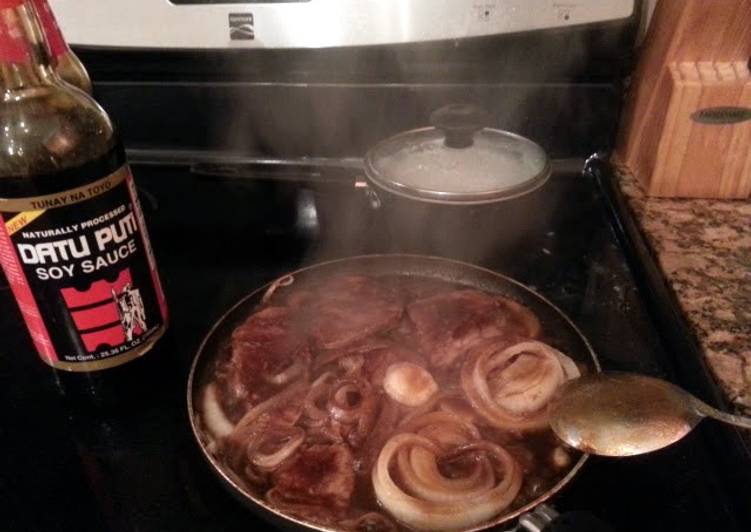Louise's (Bistek Tagalog) Beef Steak. This recipe for bistek tagalog, which is also known as beefsteak, is easy to follow. Beef slices cooked in soy sauce with lemon and onions. This video will show you how to cook Bistek Tagalog (Filipino Beefsteak).
 I guess it is safe to say that our Bistek Tagalog is actually of Spanish influence.
The name, apparently, they loaned from the English "beefsteak".
Bistek Tagalog is the Filipino version of the Beefsteak.
You can cook Louise's (Bistek Tagalog) Beef Steak using 8 ingredients and 5 steps. Here is how you achieve it.
I guess it is safe to say that our Bistek Tagalog is actually of Spanish influence.
The name, apparently, they loaned from the English "beefsteak".
Bistek Tagalog is the Filipino version of the Beefsteak.
You can cook Louise's (Bistek Tagalog) Beef Steak using 8 ingredients and 5 steps. Here is how you achieve it.
Ingredients of Louise's (Bistek Tagalog) Beef Steak
- Prepare of Louise's Filipino style beef steak.
- Prepare 1 kg of flat beef steak (any thin-sliced steak would do).
- You need 2 clove of garlic.
- It's 1/2 cup of soy sauce.
- You need 1 medium of white onion.
- It's 1 pinch of pepper.
- Prepare 1 of small lemon or calamansi.
- You need 2 tbsp of oyster sauce.
It is comprised of thinly sliced beef cooked in soy sauce and lemon juice and garnished with caramelized onion rings. Marinate beef in soy sauce, lemon and pepper for at least one hour. This is a Filipino style beef steak. Made from thinly sliced beef and marinated with soy sauce, calamansi juice, pepper and liquid seasoning.
Louise's (Bistek Tagalog) Beef Steak step by step
- Put oil in a cooking pan, set in medium heat..
- Add garlic(minced) and onions(slice thinly into rings). sautee for about 1 minute.
- Add your beef,oister sauce, pepper, soy sauce and lemon.
- Let it simmer for 10 min or until beef is fully cooked..
- Viola! serve over a cup of rice.
Cooking this bistek is simple and requires few and simple ingredients. First of all, you should marinate the meat with calamansi juice, soy sauce and. Bistek Tagalog is a traditional meat dish originating from the Philippines. It consists of thinly sliced beef that's marinated and braised in a combination of citrus juice (usually from lemon, lime, or calamansi fruit), onions, garlic, soy sauce, and pepper. It is believed that the dish was derived after the Spanish.